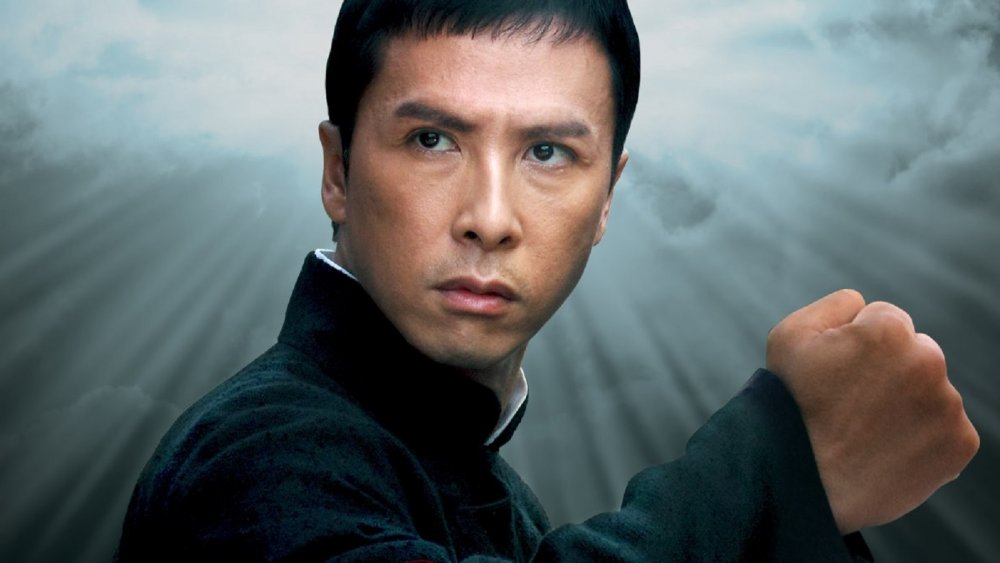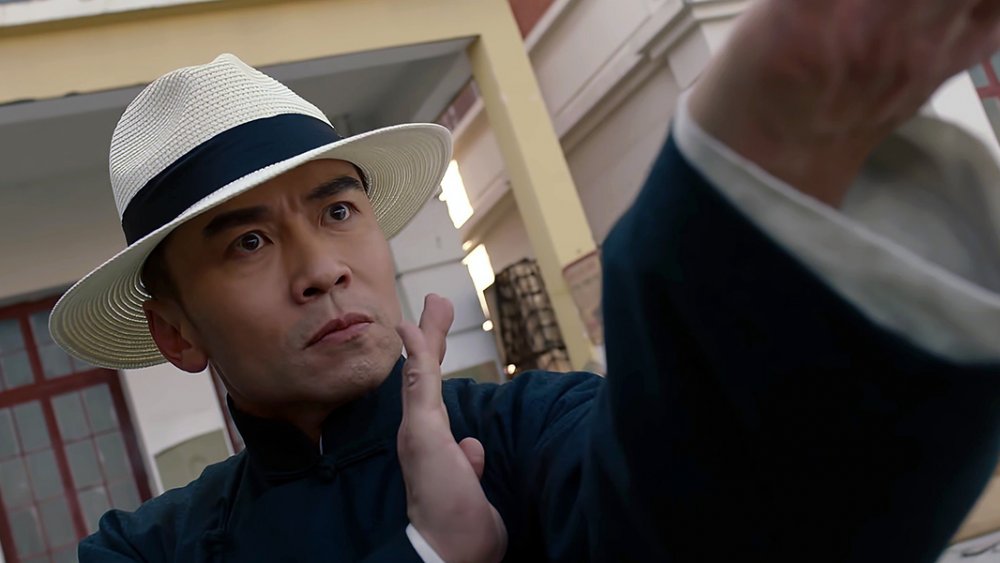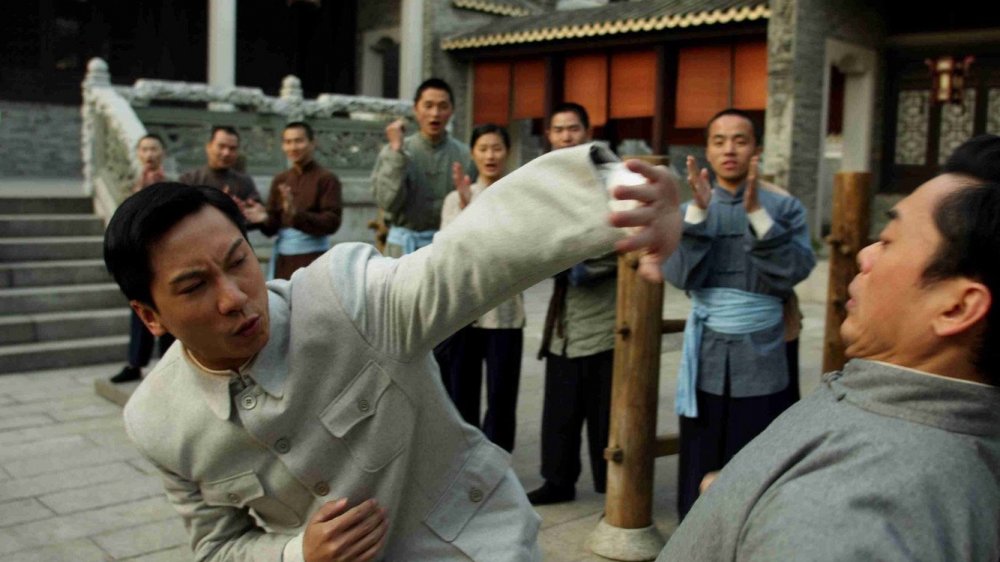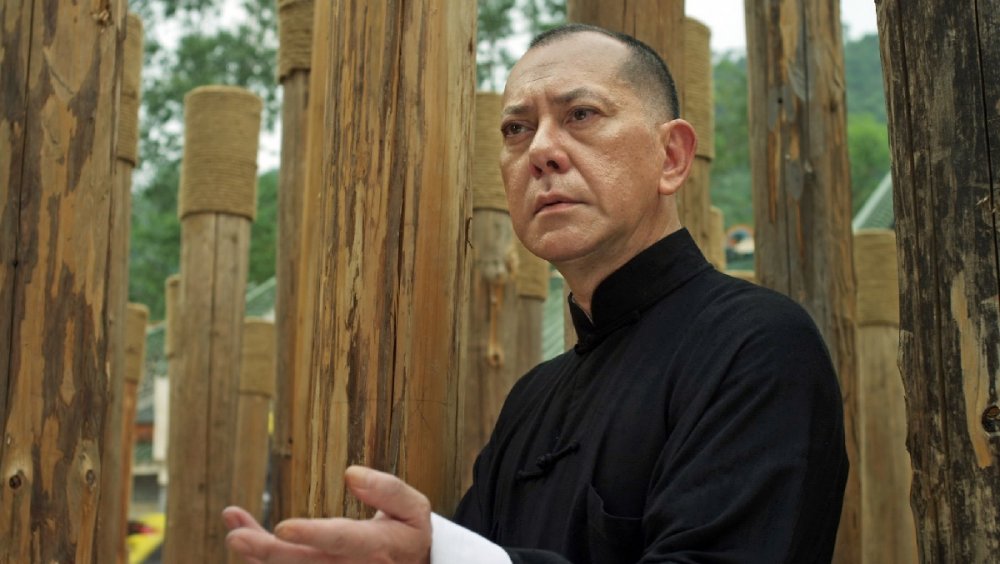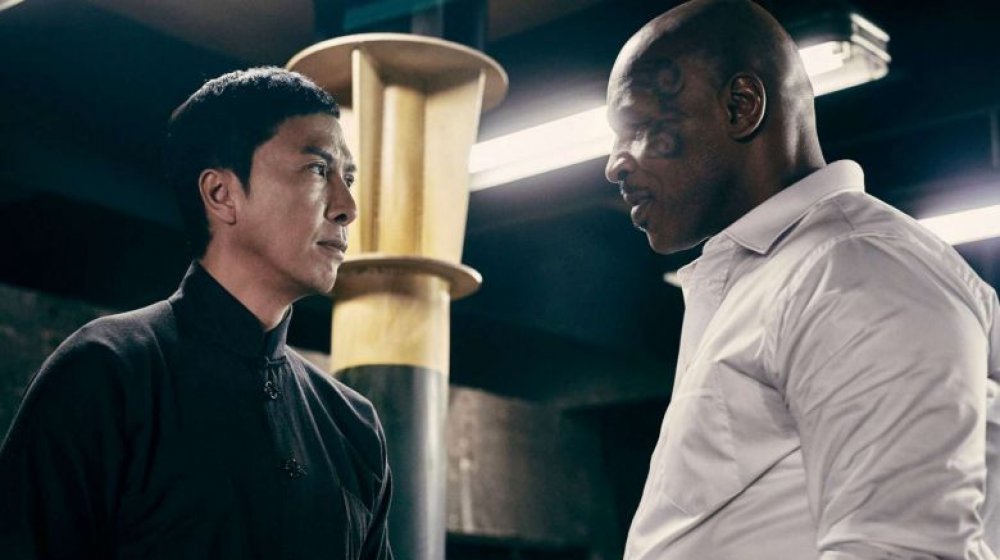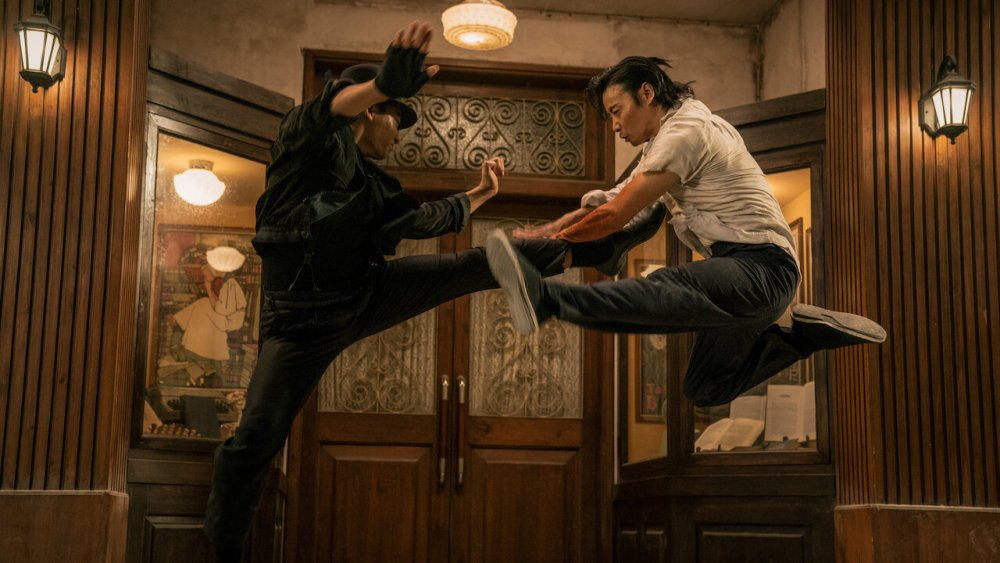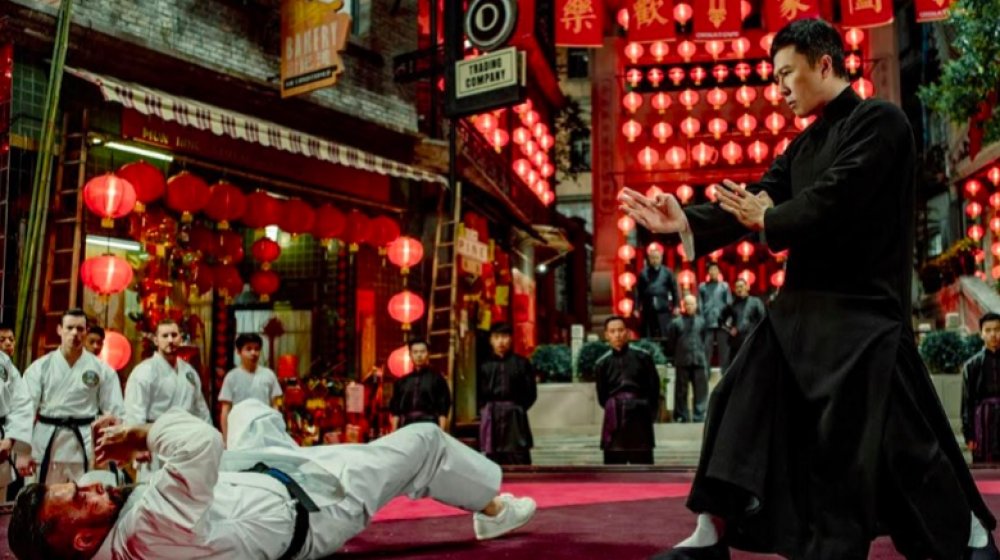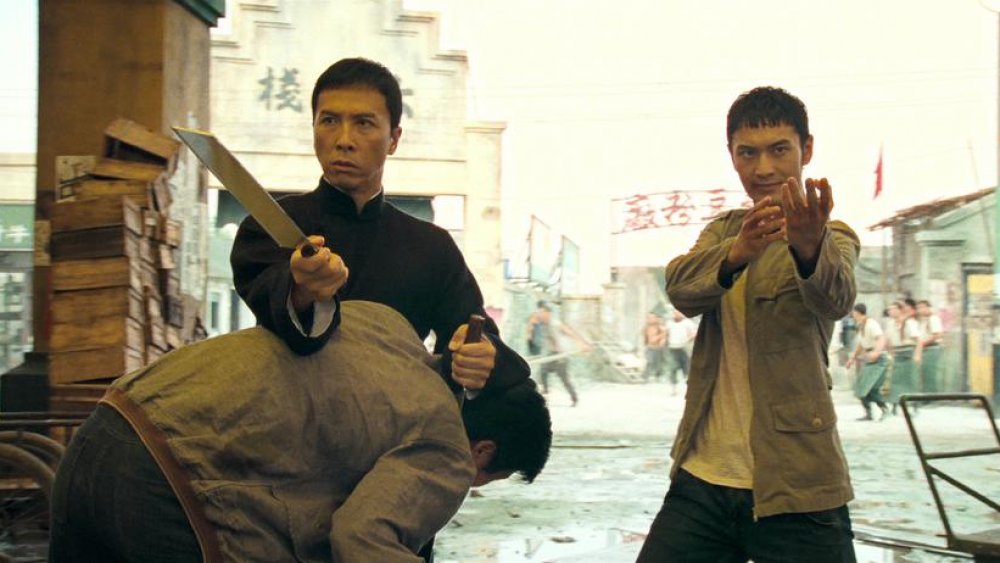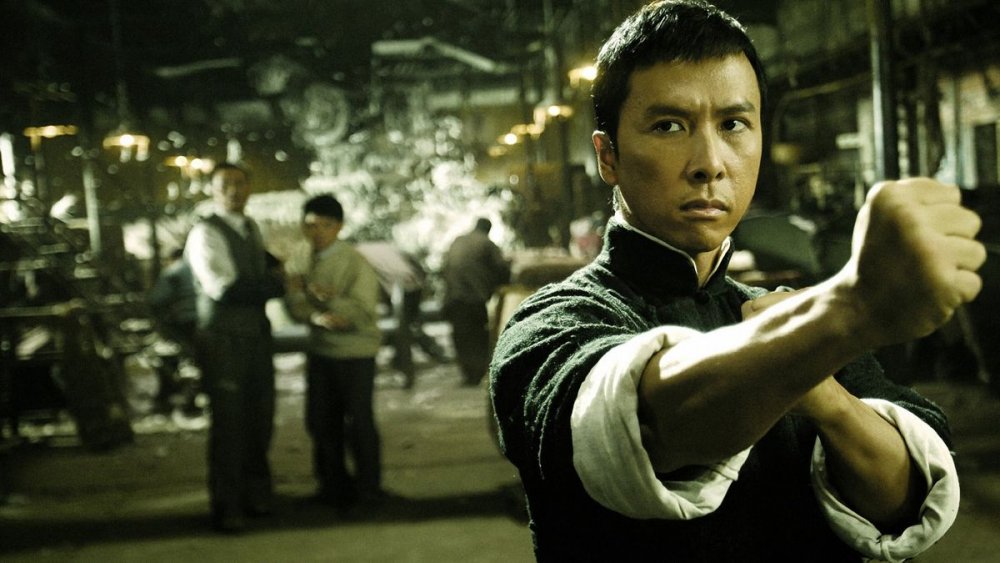Every Ip Man Movie Ranked Worst To Best
In the West, he's known as the guy who taught Bruce Lee how to fight, but in his native China, kung fu grandmaster Ip Man is an icon in his own right. Ip began his training in the Wing Chun style of kung fu at the age of 12. After spending his childhood between his home in Foshan and the island of Hong Kong (he left the mainland for good when the Chinese Communist Party came to power in 1949), he opened a kung fu school, the first of its kind. Ip would pass on his expert knowledge to Lee and numerous others before succumbing to cancer at the age of 79. His legacy would remain largely unknown in the wider world until 2008, when Donnie Yen portrayed him for the first time.
When Bruce Lee passed, what's become known as the "Bruceploitation" period of Hong Kong cinema began, with filmmakers casting lookalikes in crude movies like (no joke) Enter Another Dragon. When Donnie Yen's Ip Man became a hit at home and abroad, it kick-started what fans of that film refer to as the "Ipsploitation" era. Yen went on to reprise the role in several sequels in the decade that followed, but he wasn't the only actor playing the kung fu veteran — numerous other Ip Man movies were released in that time, and while some have been pure cash-grabs, others are essential viewing for martial arts movie fans. Here's every Ip Man movie, ranked worst to best. Spoilers ahead.
Ip Man and Four Kings (2019)
Released just a few months before Donnie Yen's final Ip Man movie hit cineplexes in 2019, straight-to-VOD flick Ip Man and Four Kings stars Michael Tong as the eponymous grandmaster, who gets wrongfully accused of murder. Ip Man is framed by a rival martial arts school with shady foreign backers in director Fu Liwei's low-budget fight fest. To prove his innocence, Ip Man has to take down the heads of the prostitution, alcohol, gambling, and catering syndicates, a.k.a. the Four Heavenly Kings. It's a short film at just 71 minutes, but trust us, there are countless better ways you could spend that amount of time.
It's clear right from the get-go that this cash-grab of an Ip Man movie isn't afraid to steal from its predecessors — the opening scene is a shameless rip-off of the famous rainy street fight in The Grandmaster, and Tong even wears the same straw hat worn by Tony Leung in that film — but it just can't match up to them when it comes to the kung fu. While the majority of Ip Man movies employ long shots full of visually stunning battles, Ip Man and Four Kings is full of cheap and choppy editing, betraying its meagre budget. "In the grand scheme of Ipsploitation, Ip Man and Four Kings is definitely a low point," Blood Brothers said in its review, while Far East Films declared that the "saturation point for Ip Man films" had been reached with this flat offering.
The Legend is Born: Ip Man (2010)
Herman Yau's The Legend is Born: Ip Man is often referred to as Ip Man Zero by fans, who view it as the unofficial prequel to Wilson Yip's Donnie Yen-led films. Martial artist and actor Dennis To takes on the titular role, portraying a younger version of the famous grandmaster. Yau spent way more money than he usually would (he's a veteran genre filmmaker used to working on a shoestring budget), but The Legend is Born: Ip Man is still a relatively contained affair. The director shunned flashy wire work in favor of more grounded, realistic fight scenes — which, truth be told, are few and far between compared to the majority of Ip Man movies.
The Legend is Born: Ip Man leans closer to period piece than all-out kung fu flick, concentrating on Ip's early days in Foshan and his move to Hong Kong for his studies. The film takes a couple of artistic liberties, but there's a general effort to adhere to historical accuracy, something the Wilson Yip series isn't all that concerned with. Unfortunately, accuracy doesn't always equate to entertainment. Ip Man enthusiasts will no doubt get a kick out of seeing him honing his craft, but The Legend is Born: Ip Man doesn't offer much for the casual kung fu fan. The Los Angeles Times poked fun at the whole "Ip Man Zero" thing in its review, calling it "an inadvertent comment on what this particular film has to offer."
Ip Man: The Final Fight (2013)
Three years after he dropped his unofficial prequel to the Donnie Yen Ip Man films, Hong Kong filmmaker Herman Yau returned with another movie about the kung fu legend, this one taking place during his golden years. 2013's Ip Man: The Final Fight stars Anthony Wong, who brought an all-new level of gravitas to the grandmaster. Yau's second Ip Man movie takes place during the 1950s and 1960s, when the skilled martial artist is an older man battling chronic gastric pains and changing times. "We felt he would be more human with a realistic approach," Yau told Screen Anarchy. "Even a hero has to eat and go to the toilet, all this very routine biological behaviour." The motivation was pure, but all the routine behavior led to a pretty routine movie.
While there was a lot of praise for Anthony Wong's performance (Simon Abrams of RogerEbert.com called it "the best, most pure and strangely believable screen version of the [Ip] Man character yet"), that was really the only part of the movie that critics seemed to unanimously enjoy. The problem here is that Yau is a little too preoccupied with trying to give his audience a window into postwar Hong Kong. Yes, he manages to achieve that (a lot of money was spent on lavish period sets, the director told City on Fire), but it's at the expense of his protagonist — Ip Man feels like a bit of a passenger in his own biopic.
Ip Man 3 (2015)
It may be the weakest of the Donnie Yen movies, but that doesn't make Ip Man 3 totally undeserving of your time. The threequel covers similar ground to Herman Yau's Ip Man: The Final Fight, chronicling the grandmaster's life as a husband, father, and teacher in postwar Hong Kong. He still has an array of troublesome Triads to deal with, but in Wilson Yip's film, they work for a foreign boxer-turned-shady property investor named Frank, played by none other than Mike Tyson.
According to Yen, the former heavyweight champ was a fan of the first two movies and jumped at the chance to be in the third one. The pair go toe-to-toe after Ip Man learns that Frank has eyes on the local school, a fight that left Tyson with a broken finger. "Accidents do happen on set," Yen told The Hollywood Reporter, adding that his opponent was totally cool about it. "As an actor, Mike Tyson was very professional and very humble."
Yen vs. Tyson (reminiscent of Bruce Lee vs. Kareem Abdul-Jabbar in Game of Death) is a must-see battle, but the standout fight takes place when Ip Man schools a barefooted goon inside a rickety old elevator. It's the bits that string the understated fight scenes together that sometimes fall flat. Ip Man 3 lacks the on-point humor peppered throughout the previous two installments and just isn't quite as fun as a result, making it the most skippable movie in the franchise.
The Grandmaster (2013)
Influential Hong Kong filmmaker Wong Kar-wai started developing his own Ip Man biopic around the same time as the first Donnie Yen-led movie, but his wouldn't see the light of day until 2013. The film suffered a huge setback when star Tony Leung was injured while preparing to play the grandmaster — by a lowly master, no less. According to local reports, things ended badly when Leung got a little excited during a sparring session with a legit Wing Chun master, who reacted instinctively with a kick that broke the actor's arm. Leung would break his arm a second time on the first day of shooting, causing another lengthy delay. Was it worth the wait? Absolutely.
Unlike Donnie Yen, Leung wasn't a trained martial artist when he was cast as Ip Man (he took his first kung fu lesson aged 47), but you really wouldn't know it. His dedication during the preparation stages really paid off, making the action sequences just as thrilling as the dramatic ones. The film's famous late-night rainy street brawl (which was shot in the dead of winter over a grueling 40 nights) is perhaps the most iconic Ip Man scene to date, making the straw hat part of the Ip Man identity. The Grandmaster also boasts one of the best performances of Zhang Ziyi's career. The Memoirs of a Geisha star is the "real central figure" of the film according to Slant, which named The Grandmaster one of the top films of 2013.
Ip Man 4: The Finale (2019)
If Wilson Yip and Donnie Yen took the foot off the gas slightly with Ip Man 3, they put the pedal to the metal with Ip Man 4: The Finale. This slick and satisfying franchise capper takes place in 1964. The grandmaster's wife has already succumbed to cancer, and he has been diagnosed with the same disease. On the advice of his student Bruce Lee (played to perfection by doppelganger Danny Chan), Ip Man flies to San Francisco with his son, hoping to find him a good school in the States before he passes. When he notices a Chinese girl being bullied by a white cheerleader on a campus visit, he steps in to aid her and unwittingly kick-starts a feud with racist Marine Barton Geddes (Scott Adkins).
Donnie Yen's Ip Man movies have always been about the kung fu grandmaster putting anti-Chinese villains in their place, but Barton Geddes is on another level. The karate-obsessed military man despises all things China, especially kung fu, which is only good for folding clothes in his opinion. This makes the moment Ip Man defeats him in the closing stages all the more sweet, but the montage that comes after the showdown is the real cherry on the cake — the film ends with a nostalgic highlights reel of the first three films. For Yen, who was 56 when he made Ip Man 4: The Finale, this was the perfect time to sign off, and he signs off in style.
Master Z: Ip Man Legacy (2018)
Kung fu film veteran Yuen Woo-Ping has worked on a number of big Hollywood movies (he was a choreographer on The Matrix films and Quentin Tarantino's Kill Bill duology), but at home in Hong Kong, he's also a respected director. He made a film about Wing Chun (simply titled Wing Chun) with Michelle Yeoh and Donnie Yen back in the mid-'90s, and all three would reunite for his unforgettable Ip Man spin-off: Yeoh as an actress, Yen as a producer. The film follows Cheung Tin Chi (Max Zhang), who has fallen out of love with martial arts since his defeat at the hands of Ip Man in Ip Man 3. He tries to go straight, but when thugs burn his grocery store to the ground following an altercation, he's soon kicking butt again.
He wasn't one of the good guys in Ip Man 3, but we get to see Zhang's character turn a corner in this uber-polished spin-off. He refuses the money when the gang tries to buy his silence, and by the end of the picture, he's learned to use his Wing Chun for good again. He has a pretty special throwdown with Ong-Bak star Tony Jaa, and, in keeping with tradition, there's a hulking foreigner he needs to cut down to size, this time in the form of Dave Bautista. "It was a hard film to make, but he's just incredible, man," Bautista said of Yuen (per Entertainment Weekly). "I just love him."
Ip Man 2 (2010)
It's not often that a sequel lives up to the standard set by the original, but 2010's Ip Man 2 made it look easy. The second installment benefits greatly from having the legendary Sammo Hung on board as choreographer and co-star. We can only imagine what the already sensational fight scenes might have looked like had the industry vet been a little younger and in better health — Hung (who plays a Hung Ga master that starts out hating Ip Man but gradually becomes his friend) underwent heart surgery prior to filming and remarkably was still in recovery when he filmed Ip Man 2. "That alone makes the film worth checking out," the Los Angeles Times said in its glowing review. "The fights are not over-edited the way a Hollywood-style action sequence would be, but rather much of the action happens within the frame itself, feet and hands flying about with strong, decisive camera movements often giving the scenes an unexpectedly graceful quality."
The Los Angeles Times wasn't alone in its praise of the film, which ended up scoring a 96 percent rating on the Tomatometer, an incredible feat for a kung fu movie. The film covers Ip Man's exit from Japanese-controlled Foshan with his family and their arrival in Hong Kong, a British colony at the time. It has definite Rocky IV vibes — when Hung is killed in the ring by a British boxer, it's up to Ip Man to defend his kung fu and his culture.
Ip Man (2008)
2008's Ip Man didn't just spawn a decade-spanning franchise — it turned the eponymous historical figure into a true legend, putting him on par with his most famous disciple in the eyes of many. It had the same effect on Donnie Yen himself. He joined the likes of Bruce Lee, Jackie Chan, and Jet Li as an internationally renowned martial arts movie star with Ip Man, which came out of nowhere to blow the minds of critics the world over. "The action is enthralling," Empire magazine said, while Time Out praised the "engaging Seven Samurai-style storyline."
The first and best Ip Man film begins in the late 1930s, on the eve of the Second Sino-Japanese War. Ip Man isn't yet the Wing Chun master he's destined to become known as, preferring to practice his kung fu in private. When Japanese forces invade and occupy his hometown, however, he begins teaching the locals his techniques so that they can defend themselves against the foreign intruders. When one Japanese general sees Ip Man's skill in combat, he attempts to coerce him into teaching his troops, but Ip Man, of course, refuses, challenging the general to a fight instead. With his pride and his people at stake, the future grandmaster goes full beast mode, delivering a brutal beatdown that inspires his neighbors to revolt.
As a kung fu flick, Ip Man has everything. Not only is it the best movie about the Wing Chun legend, it's among the best martial arts movies, period.
